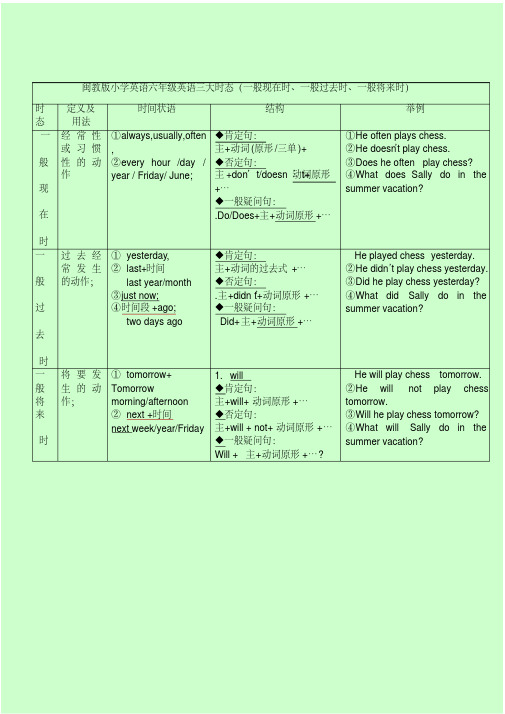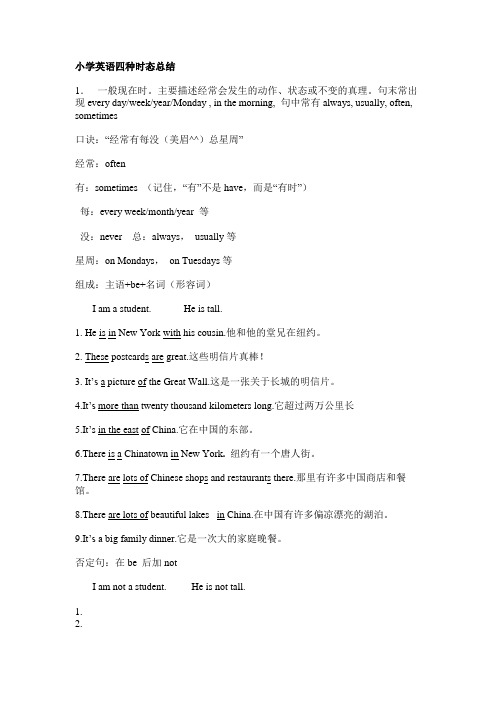六年级上册一般现在时一般将来时
闽教版小学英语六年级三大时态(一般现在时、一般过去时、一般将来时..

闽教版小学英语六年级英语三大时态(一般现在时、一般过去时、一般将来时)时态定义及用法时间状语结构举例一般现在时经常性或习惯性的动作①always,usually,often,②every hour /day /year / Friday/ June;◆肯定句:主+动词(原形/三单)+◆否定句:主+don’t/doesn’t+动词原形+…◆一般疑问句:.Do/Does+主+动词原形+…①He often plays chess.②He doesn’t play chess.③Does he often play chess?④What does Sally do in thesummer vacation?一般过去时过去经常发生的动作;①yesterday,②last+时间last year/month③just now;④时间段+ago;two days ago◆肯定句:主+动词的过去式+…◆否定句:.主+didn’t+动词原形+…◆一般疑问句:Did+主+动词原形+…He played chess yesterday.②He didn’t play chess yesterday.③Did he play chess yesterday?④What did Sally do in thesummer vacation?一般将来时将要发生的动作;①tomorrow+Tomorrowmorning/afternoon②next +时间next week/year/Friday1.will◆肯定句:主+will+动词原形+…◆否定句:主+will + not+动词原形+…◆一般疑问句:Will + 主+动词原形+…?He will play chess tomorrow.②He will not play chesstomorrow.③Will he play chess tomorrow?④What will Sally do in thesummer vacation?一、选择题( ) 1.Ben usually at 6:40. A.got up B.get up C.gets up ( ) 2.In the past my mother my bed. A.make B.made C.makes ( ) 3.Where you in the summer vacation?A.areB.isC.were( ) 4.Did you a good time in the USA?’tA.have; Yes,I didB.had; Yes,I didC.have; No,I don( ) 5.Do you often do housework at home?A.Yes,I does.B.No,I don’t.C.Yes,I am.( ) 6.Does he clean his room now?’t.A.Yes,she does.B.Yes,he does.C.No,he don( ) 7.li Hong usually at 6:30 in the morning.But this morning she at 7:00.A. get;gotB. gets;getC.gets;got( ) 8. How Mike go to school every day?A.doB.isC.doesD.are( ) 9. The students the football match now.A.watchB.to watchC.are watchingD.watching( ) 10. Did you your room yesterday?A.cleanB.cleansC. cleanedD.cleaning二、填空题1.Listen,there are many students (sing)in the classroom.2.. Look! Sarah is (dance).3. My mother often (wash)clothes on the weekends.4. He (buy) a present for his mother yesterday.5. John (visit)Qingdao next Sunday.6.He usually____(go) to school on foot.7.Does she_____(go) to school on foot?8.Did she ____(go) to school on foot?9.They_____(go) to school on foot yesterday.10.____ she going to school on foot?助动词do,does,did或者它们的否定形式的使用1) you like this magazine?2) The girl like bread for breakfast.3) ---What she at the weekends?---She usually plays games with her friends.4) ---What you do last Sunday? ---I wrote to my friend.5) -- He not visit a farm last National Day holiday.6) They not like playing volleyball.7) --- Jim have a picnic with his family every Saturday?---Yes, he8) Helen with Yang Ling go to school by bike every day? 9) [Do/Does]______ you go to school everyday? No, I don’t. 10) [Do/Does]______ Jack and Peter like apples?11)[Do/Does]______ he watch TV at night? Yes he does. 三.连词成句(请注意大小写)1. the summer you where were in vacation2.did do yesterday what youA good did have time the you in a4. Wang Tao his yesterday did make bed?5. does often housework home Sally at do6.will where you for the go holidays7. to bookstore yesterday he went the.。
六年级上册一二单元英语知识点总结

六年级上册一二单元英语知识点总结一、语法知识点总结1. 动词时态六年级英语学习的时态主要包括一般现在时、一般过去时和一般将来时。
在学习一般现在时时,学生需要掌握动词第三人称单数的变化规则,以及可用于表示时间状况的频率副词;在学习一般过去时时,需了解动词过去式的构成方式,并能正确使用一般过去时中的时间状况词;在学习一般将来时时,需要学习情态动词“will”和“be going to”的用法,以及时间状况词的运用。
2. 形容词和副词比较级学生需要掌握形容词和副词的比较级构成规则,以及在实际应用中的使用技巧。
3. 名词单复数在六年级英语学习中,学生需要掌握名词单数变复数的规则,以及不规则变化的名词单复数形式。
4. 介词的使用学生需要掌握介词在句子中的作用和用法,包括表示时间、地点、方式等。
5. 定冠词和不定冠词的用法学生需要学会正确使用定冠词“the”和不定冠词“a/an”,并理解它们的含义和用法。
6. 句子的语序学生需要掌握英语句子的基本语序,进行正确的句子构成和翻译。
二、词汇知识点总结1. 需要学习并掌握的基本词汇:人称代词、冠词、名词、动词、形容词、副词、介词、数词等基础词汇,构建语言基础。
2. 动词过去式和过去分词的辨认和运用学生需要掌握动词的过去式和过去分词在句子中的使用,以及一些不规则动词过去式的变化形式。
3. 颜色、服装、家居等日常生活词汇学生需要学会用英语描述颜色、服装、家居等日常生活中的用词,丰富词汇量。
4. 时间、天气、季节等相关词汇学生需要掌握有关时间、天气、季节等词汇,能够用英语表达日期、天气状况和季节变化。
三、阅读知识点总结1. 阅读理解学生需要掌握阅读理解中的做题技巧,包括提取关键信息、推断含义、理解上下文等。
2. 词汇理解学生需要通过阅读来积累词汇,理解词汇在句子和段落中的使用,提升词汇量和语感。
3. 看图写话在阅读中,学生需要学会通过图片来进行简单的写作,进行故事情节串联,提高语言表达能力。
小学英语 六年级四种时态总结

小学英语四种时态总结1.一般现在时。
主要描述经常会发生的动作、状态或不变的真理。
句末常出现every day/week/year/Monday , in the morning, 句中常有always, usually, often, sometimes口诀:“经常有每没(美眉^^)总星周”经常:often有:sometimes (记住,“有”不是have,而是“有时”)每:every week/month/year 等没:never 总:always,usually等星周:on Mondays,on Tuesdays等组成:主语+be+名词(形容词)I am a student. He is tall.1. He is in New York with his cousin.他和他的堂兄在纽约。
2. These postcards are great.这些明信片真棒!3. It’s a picture of the Great Wall.这是一张关于长城的明信片。
4.It’s more than twenty thousand kilometers long.它超过两万公里长5.It’s in the east of China.它在中国的东部。
6.There is a Chinatown in New York.纽约有一个唐人街。
7.There are lots of Chinese shops and restaurants there.那里有许多中国商店和餐馆。
8.There are lots of beautiful lakes in China.在中国有许多偏凉漂亮的湖泊。
9.It’s a big family dinner.它是一次大的家庭晚餐。
否定句:在be 后加notI am not a student. He is not tall.1.2.3.4.5.6.7.8.9.疑问句:be 动词提前到第一位。
复习一般现在时,一般过去时,一般将来时,现在进行时

复习一般现在时,一般过去时,一般将来时,现在进行时回顾一般现在时、一般过去时、一般将来时和现在进行时一、考点、热点回顾1、一般现在时A、用法①表示现阶段经常性、习惯性的动作;②表示现阶段经常性、习惯性存在的状态;③表示客观真理;④表示格言或警句中。
He usually goes to school by bus.The sky is blue.The earth moves around the sun.Shanghai lies in the east of China.Pride goes before a fall. 骄者必败。
B、常用的时间状语often, usually, always, every morning/night/evening/day/week and so on.2、一般过去时A、用法①表示过去某个时间发生的事;②表示表示过去某个时间存在的状态;③表示过去反复发生的动作。
I saw a very good film yesterday.It was very cold last night.B、常用的时间状语yesterday, yesterday morning/afternoon/evening, last week/month/year, in 1980 and so on.3、一般过去时A、用法①表示在将来某个时间要发生的事;②表示表示在将来某个时间存在的状态;Mrs Wu will teach us English this term.I will go back to my hometown tomorrow.B、具体表现形式①助动词will+动词原形We won’t leave before eight.②be going to do sth.表示即将发生某事或打算、计划要做某事。
I’m going to do my homework this evening.③come, start,go ,move, leave, travel等动词常用进行时态表示按计划将要发生的事。
六年级英语上册知识点总汇

六年级英语上册知识点总汇一、介词与介词短语1. 常见介词介词是连接名词、代词或动词与其宾语之间关系的词语。
六年级上册中常见的介词有:in、on、at、to、from、for、with等。
2. 介词短语的用法介词短语由介词和其宾语构成,常用来表示时间、地点、原因、目的等。
例如:in the morning(在早晨)、at school(在学校)、from Monday to Friday(从星期一到星期五)等。
二、时态与语态1. 一般现在时一般现在时表示经常性、习惯性或普遍性的动作或状态。
句子结构为主语 + 动词原形,例如:She likes swimming.(她喜欢游泳。
)2. 一般过去时一般过去时表示过去发生的动作或状态。
句子结构为主语 + 动词过去式,例如:They visited the museum last week.(他们上周参观了博物馆。
)3. 一般将来时一般将来时表示将要发生的动作或状态。
句子结构为主语 + will + 动词原形,例如:I will go to the park tomorrow.(我明天将去公园。
)4. 被动语态被动语态表示主语是动作的承受者。
句子结构为主语 + be + 过去分词,例如:The book was written by Mark Twain.(这本书是马克·吐温写的。
)三、名词与数词1. 可数名词与不可数名词可数名词指可以计数的名词,可以有单数和复数形式;不可数名词则不能计数,只有单数形式。
例如:a pen(一支笔,可数名词)、water(水,不可数名词)等。
2. 名词所有格名词所有格表示所属关系,通常在名词后加's构成。
例如:Tom's book(汤姆的书)。
3. 基数词与序数词基数词表示数量或顺序,例如:one、two、three等;序数词表示顺序,例如:first、second、third等。
四、形容词与副词1. 形容词的比较级和最高级形容词的比较级表示两个事物之间的比较,结构为形容词 + er + than,例如:taller than(比...更高);最高级表示三个或三个以上事物中的最高级,结构为the + 形容词的最高级,例如:the tallest(最高的)。
六年级上册1~4单元知识点英语

六年级上册1~4单元知识点英语一、词汇1. 名词复数形式在英语中,名词的复数形式有一定的规则,例如一般在名词末尾加-s或-es,有些名词则需要变换字母形式,如man变为men,child变为children等。
2. 动词的时态英语动词的时态包括一般现在时、一般过去时、一般将来时等。
学生需要掌握动词的不同时态形式及其用法。
3. 形容词和副词形容词用来修饰名词,而副词则用来修饰动词、形容词或者其他副词。
学生需要了解形容词和副词的用法,掌握其比较级和最高级的变化规律。
4. 代词代词用来代替名词,分为人称代词、物主代词、指示代词等。
学生需要熟练掌握不同类型代词的用法和变化。
5. 介词短语介词短语是由介词和宾语组成的词组,用来表示名词或代词与其他部分之间的关系。
学生需要学习介词短语的基本用法及常见搭配。
6. 情态动词情态动词用来表达说话人的态度、能力、意愿等,包括can、could、may、might、should、shall、will、would等。
学生需要掌握情态动词的用法及其不同意义。
7. 数词数词用来表示数量,包括基数词和序数词。
学生需要学会基数词和序数词的用法及其变化规则。
二、语法1. 一般现在时一般现在时表示经常性、习惯性的动作或客观事实。
句子的肯定形式中,主语加动词原形;否定形式中,在动词前加助动词do或does,并在动词后加not;疑问形式中,助动词do或does置于主语之前。
2. 一般过去时一般过去时表示过去某个时间里发生的动作或状态。
句子的肯定形式中,动词变为过去式;否定形式中,在动词前加助动词did,并在动词后加not;疑问形式中,助动词did置于主语之前。
3. 一般将来时一般将来时表示将来某个时间或某个时间的系列动作。
句子的肯定形式中,将来时态由助动词shall或will加动词原形构成;否定形式中,在助动词后加not;疑问形式中,将来时态由助动词shall或will置于主语之前。
4. 句子的基本结构英语句子的基本结构由主语、谓语和宾语构成。
外研版六年级上册英语第1、2天复习的四大时态
小学四大时态(一般现在时、现在进行时、一般将来时、一般过去时)一般现在时一般现在时:表示通常性、规律性、习惯性的状态或者动作(有时间规律发生的事件)的一种时间状态。
1.“经常发生的动作”,比如每天起床、吃饭、上学,一个星期去几次超市或新华书店等。
这些事件中,有的是有规律的,有的是偶尔做几次。
这些都算经常发生的事件。
我们要告诉人们的,是这个动作经常发生,是一般的情况而不是具体的某一次。
2.事物存在的状态。
3.有些动作或状态是永恒的,比如长江向东流、地球绕着太阳转,肯定式疑问式否定式否定疑问式I work. Do you work? I don't work. Don't you work? You work. Do you work? You don't work. Don't you work? We work. Do you work? We don't work. Don't you work? They work. Do they work? They don't work. Don't they work?He(She,It) w orks. Does he(she,it)work?He(She,It) doesn't work.Doesn't he(she it) work?基本用法1表示经常性或习惯性的动作或存在的状态2表示客观事实或普遍真理3在时间、条件等状语从句中,用现在时表示将来4在某些以here,there开头的句子中,用一般现在时表示正在发生的动作当主语是第三人称单数时:动词变相应的第三人称单数形式肯定句主语+动词s+其它否定句主语+doesn't+动词原形+其它一般疑问句Does+主语+动词原形+其它肯定回答Yes,主语+does否定回答No,主语+doesn't特殊疑问句特殊疑问词+一般疑问句一般现在时的分析当主语不是第三人称单数时:肯定句主语+动词原形+其它否定句主语+don't+动词原形+其它一般疑问句Do+主语+动词原形+其它要注意,句式结构错则全都错。
六年级上一般现在时现在进行时一般将来时专项练习
六年级上一般现在时、现在进行时、一般将来时、专项练习Class:_________ Name:_________ No:_________小学英语3种时态复习一、用动词的正确形式填空1. I ________________ do my homework every evening.2. We _________________ fly kites in the park next Sundays.3. Tom ___________play the piano every Saturday. Now he________ play.4. She _______like swimming. She ___________ swim this weekend.5. Usually my mother _______ wash the dishes after lunch. But mygrandma____________ wash now.6. Look at the man He ___________ read a magazine.7. Look The plane ______________ fly over the building.8. Listen My aunt ____________ sing in the room.She is a singer. She _____ like singing. She _______have a music show. She is excited.9. Tom and Mike always ______ swim in the river. They _____ swim in the swimming pool this Sunday. Look They ______ swim.10. What ______ you usually ______ do in the eveningI _______ play computer games.11. What _______ you _______ do nowI _______ make a paper plane.12. What _______ he _______ do nowHe ______ dance.13. ______ your mother ______ read newspaper in the morningYes, She ________ .16. _______ you _______ like fishingNo, I ______ . I like ______ swim,but my brother ______ like.17. How ______ your father _______ go to work every dayHe ______ go by bike. But it’s cold today. He ______ take the No.21 bus, 18. _______ the monkey _______ like climbing trees Yes, it _______ .19. What _______ your father ______ do after lunch He _______ read a comic book.20. ________ you ______ collect stamps Yes. I _______ .________ your brother ______ collect, too No, he ________ .二、选择题1. _____ he _____ to the park at 6:30 in the morning No,he _____ .A. Does; goes; doesB. Does; go; doesn’tC. Does; go; does2. Tim always _____ a picture at home. He _____ a car now.A. draws; is drawingB. draw; drawC. draws; draw3. She usually _____ her friends. They often _____ tea.A. see; drinkB. sees; drinksC. sees; drink4. He usually _____ the dishes at night, but tonight he _____ clothes.A. wash; washB. washes; is going to washC. is washing; washes5. Mr. Green usually _____ his newspaper in the evening, but he and his wife _____ television this evening.A. reads; watchesB. reads; are going to watchC. reads; watch6.Where are the man and the womanThey _____ near the tree.A. sitB. sitsC. are sitting7. _____ your father _____ divingNo, he _____ .He ______ writing stories.A. Does; like; doesn’t; likesB. Does; likes; doesn’t; likeC. Do; like; don’t; likes8. Mr. Green often _____ his newspapers at night. But he _____ an interestingbook tonight.A. reads; readsB. reads; readC. reads; is going to read9. The old man _____ playing sports in the park. He _____ morning exercise now.A. likes; is doingB. likes; doesC. like; doing10. Where ______ the boy _____He _____ across the river now.A. does; swim; swimsB. is; swimming; is swimmingC. is, swim, is swimming11. _____ you _____ to music nowYes, we _____ .A. Do; listen; doB. Did; listen; didC. Are; listening; are12. Look Two cats ______ across the wall.A. runB. runsC. are running13. She _____ tea, but he _____ .A. likes; doesn’t B; like; don’t C. like; doesn’t。
六上英语一般将来时,现在进行时,一般现在时,情态动词规则
六上英语一般将来时,现在进行时,一般现在时,情态动词
规则
以下是六上英语中一般将来时、现在进行时、一般现在时和情态动词的规则:
1. 一般将来时:
结构:will + 动词原形
示例:I will go to the park tomorrow.
2. 现在进行时:
结构:be (am/is/are) + 动词-ing
示例:They are playing basketball now.
3. 一般现在时:
结构:动词原形 (第三人称单数时加-s/-es)
示例:I go to school every day.
4. 情态动词:
can: 表示能力或可能性
示例:I can speak English.
may: 表示许可或可能性
示例:You may use the computer.
must: 表示必要或义务
示例:I must finish my homework.
shall: 表示建议或命令
示例:You shall stay out of the garden.
will: 表示意愿或将来时间
示例:I will help you.
这些规则是英语语法中的基础部分,需要不断练习和巩固。
如需更多信息,建议查阅语法书籍或咨询英语教师。
2014六年级英语上册一般现在时_将来时和现在进行时的区别
Tips:要记住噢!
• • • • • • • •
What are you going to do? I’m going to+活动内容 Where are you going? I’m going+地点 When are you going? I′m going +时间 How are you going? I ′m going +交通方式
( A) 1.I have to ______ my mother wash clothes. A. help B. helps C. helping D. to help ( B) 2 I’m going to buy an English book. A. Do you have comic book? B. What are you going to buy? C. This afternoon. D. I’m going to plant trees. ( B) 3.--Are you going to buy books? --Yes. I want to buy comic books. A. some, any B. any, some C. any, any D. some, some (B) 4. Where are you going this afternoon? A. I’m going to buy some comic books. B. I’m going to the bookstore. C. Can I help you? D. I’m going to visit my aunt. ( c) 5. ---This afternoon. A. Where are you going? B. What are you going to do? C. When are you going? D. What’s your name? ( D) 7.What___________they_____________next week? A. do;do B. are;doing C. does;does D. are;going to do (C )8.Where are you going _____ the weekend? A. to B. in C. on D. about (A ) 10.She’s going to ______________the Great Wall next week. A. visit B. visits C. visiting D. is visiting
- 1、下载文档前请自行甄别文档内容的完整性,平台不提供额外的编辑、内容补充、找答案等附加服务。
- 2、"仅部分预览"的文档,不可在线预览部分如存在完整性等问题,可反馈申请退款(可完整预览的文档不适用该条件!)。
- 3、如文档侵犯您的权益,请联系客服反馈,我们会尽快为您处理(人工客服工作时间:9:00-18:30)。
复习重点:一般现在时&一般将来时Name: ________________Class: ________________一般将来时一、一般将来时表示还没发生的事情,即打算,准备去做的事情(未做)时间标志:tomorrow, tonight(今晚) next(下一个)… this…构成:"be (is, am, are) going to +动词原形/"表示即将发生的或打算最近要做的事情,主要用于口语。
例如:I am going to see a film this afternoon. 我打算今天下午打算看一场电影。
We are going to the bookstore this evening. 今天晚上我们要去书店。
它的be动词是随着不同的人称变化而变化的。
如: I am going to ….. He is going to … They are going to …. We are going to …. You are going to ….二、用适当的be动词填空并翻译句子。
1.I _______ going to read books2.My sister _______going to sing a song3.My parents _______ going to go to the cinema this4.We _________ going to take a trip next5. My uncle and my aunt ___________going to wash the clothes tomorrow.请你写一篇文章:Winter Holiday is coming, Kelly is writing a diary about her holiday plan, 假如你是Kelly, 请以“My Winter Holiday”为主题,根据以下思维导图,写一个寒假计划。
____________________________________________________________________________________________________________________________________________________________________________________________________________________________________________________________________________________________________________________________________________________________________________________________________________________________________________________________________________________________________________________________________________________________________________________________________________________________请你写一篇文章:Weekend is coming, Tom is writing a diary about her weekend plan, 假如你是Tom, 请以“My Weekend Plan”为主题,根据以下思维导图,写一个周末计划。
____________________________________________________________________________________________________________________________________________________________________________________________________________________________________________________________________________________________________________________________________________________________________________________________________________________________________________________________一、回答问题1.Where does your mother work2.What does your father do in the evening3.How does your mother go to school4.What do your parents do in the morning5.What’s your sister’s hobby6. What are you going to do this weekend二、翻译以下句子。
1. 我妈妈在一个邮局上班。
_________________2. 我弟弟喜欢在晚上看故事书。
__________3. 我爸爸喜欢在周末踢足球。
____________4. 我们喜欢画卡通。
______________________________5. 他们通常在周末做作业。
_______________6. 我爸爸通常开小车上班。
_______________7. 你打算走路上班吗 _______________________8. 我哥哥在一个医院上班。
____________________9. 我爷爷住在上海。
_________________________10. 我叔叔想成为一个商人。
____________________一般现在时(一)一般现在时描述经常发生的事情或状态,或经常做的动作。
句子中常有单词often ,sometimes, usually, always(总是),everyday, every week, every month, on Mondays, on the weekend.在一般现在时的句子中,第一人称、第二人称、复数人称为主语的句子动词都是用原形的。
如:I have many friends. 我有很多朋友。
They like playing the pipa on the weekend.他们喜欢在周末弹琵琶。
We study Chinese at school. 我们在学校学习中文。
You go to work by subway every day.你每天乘地铁上班。
My cousins usually fly kites on Sundays. 我表弟们通常在星期天放风筝。
(二)但在第三人称单数为主语的句子中,动词就要加上s,es.如:He has many friends. 他有很多朋友。
She likes playing the pipa on the weekend.她喜欢在周末弹琵琶。
He studies Chinese at school. 他在学校学习中文。
Tom goes to work by subway every day.汤姆每天乘地铁上班。
My cousin usually flies kites on Sundays. 我表弟通常在星期天放风筝。
(三)写作文时,如果是一般现在时,主语是第三人称,那么,动词也要用s 或es 形式。
《My Teacher》I have a maths teacher. He is Mr He. He’s not tall. He’s a little fat. He ha s big eyes. He likes playing basketball. He likes running, too. He also likes reading books. So he often plays basketball after work. He usually runs after work. And he always cooks Chinese food at home. He is kind. His class is fun. I like him. I like math.(四)你有好朋友吗他/她是谁他/她的外貌,性格怎么样他/她怎么去上学他/她有什么爱好他/她周末都做什么呢请以“My Good Friend”为题,写一编作文,不少于50字。
________________________________________________________________________________________________________ ________________________________________________________________________________ ________________________________________________________________________________ ________________________________________________________________________________ ________________________________________________________________________________ ________________________________________________________________________________。
